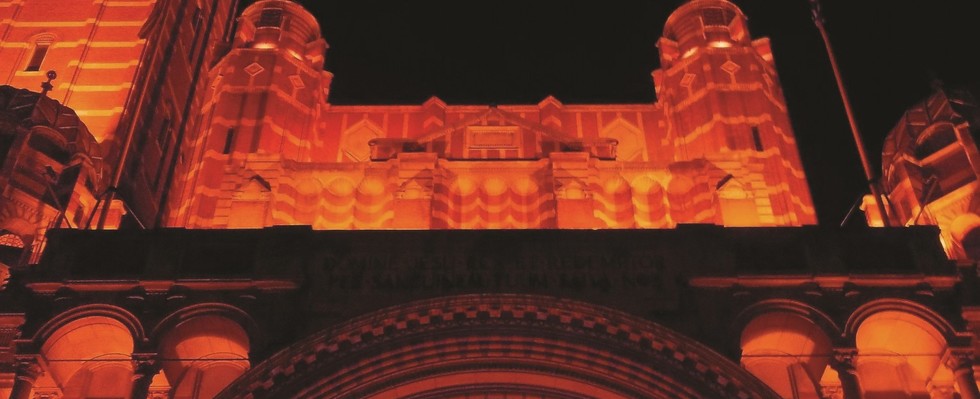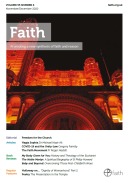Freedom for the Church
In Britain Catholics understand themselves as operating in freedom.We take pride in shrines re-established following their destruction under Henry VIII and we honour our martyrs. We are aware of the religious strife of past times.
In what is rapidly becoming an estab-lished and valued part of the Church’s year in Britain, the international charity Aid to the Church in Need organises Red Wednesday each Novem-ber, to uphold those suffering for their faith, to highlight their plight and to plead for religious freedom in the world.
FAITH magazine is glad to give its full support to this initiative. Parishes, schools, and Catholic organisations can obtain infor-mation on how to become involved with a range of activities by contacting Aid to the Church in Need at acnuk.org/newsletter which has material, constantly updated, about all that is going on.
The Church understands religious freedom as part of man’s essential dignity. It is an essential part of being human to seek the truth. The Second Vatican Council spelt this out clearly:
“It is in accordance with their dignity as persons-that is, beings endowed with reason and free will and therefore privileged to bear personal responsibility-that all men should be at once impelled by nature and also bound by a moral obligation to seek the truth, espe-cially religious truth. They are also bound to adhere to the truth, once it is known, and to order their whole lives in accord with the demands of truth. However, men cannot discharge these obligations in a manner in keeping with their own nature unless they enjoy immunity from external coercion as well as psychological freedom. Therefore the right to religious freedom has its foundation not in the subjective disposition of the person, but in his very nature. In consequence, the right to this immunity continues to exist even in those who do not live up to their obligation of seeking the truth and adhering to it and the exercise of this right is not to be impeded, provided that just public order be observed.” Dignitatis Humanae 2.
Pope St John Paul II highlighted this matter of religious freedom as a signature of his pontificate. In doing so he was pivotal in freeing Eastern Europe from the grim era of Communism. The message was – and is – that freedom and human dignity matter, and that we are answerable to God for our actions.
The Church, as St John Paul emphasised more than once “proposes, she does not impose”. Truth imposes itself on the human mind and heart. The Church guides people to the Truth.
Today in Britain the Church has popular schools and colleges, and runs youth activities and major projects for social welfare and care of the elderly and handicapped, and the good work is widely recognised. Public funds are available especially for schools: a tenth of all primary schools in Britain are Catholic schools. They are often over-subscribed and feature frequently in lists of the most successful schools.
In recent years a new issue has arisen for our Catholic schools, the full implications of which are only slowly being grasped. The present government’s project for “Relationships Education” initially included materi-al produced - with taxpayers’ money - that was both dangerous to children’s wellbeing and contrary to all good educational practice. Some came from lobby groups with very specific agendas, including that of “transgenderism”, with suggestions to children that they should consider hormonal drugs and long-term surgery if they felt they belonged in the opposite sex. Following serious concerns raised by teachers, medical staff, and parents, some of this material has been removed. But we are still left with a general approach which too readily assumes that sexual activity should be divorced from male/female marriage and parenthood, and regarded as essentially a recreational activity.
A Catholic school is free to reject such material and to use alterna-tives. But to announce a plan to do so requires courage. And a sort of embarrassed silence on the subject is becoming the norm.
We are going to have to be a lot braver than this. The Church must be free to teach what is true – and this applies to matters concerning human sexuality, human dignity, and marriage as the lifelong union of a man and a woman that establishes a new family.
Suicide is now a notable cause of death among young people in Britain. The suicide rate among young men has been rising steadily. Between 2012 and 2019 the suicides among young women rose by 93.8 per cent. A spokesman for a charity concerned with the young described this as “worrying”. Well, yes. Calls for more research are meaningless unless such research is allowed to include challenging questions on the messages about relationships, sex, family, and life’s purposes presented to our young.
Of course any Bishop, or chairman of a school governing body, or head teacher or parish priest who speaks out on this can be made to look foolish, bigoted or out of touch with reality. We have become used to fashionable slogans about sexual matters that create a deafening noise all around us. But that is precisely why the need to speak, wisely and with quiet force, is crucial. The Church is a voice of truth and, as in Eastern Europe in the recent past, can speak truth in a way that opens up a new dialogue with life-changing results.
The teachers in our Catholic schools include many who are not Catholics, or whose practice of the Faith is minimal. They may have chosen to teach in a Catholic school because they like the atmosphere, and enjoy being part of a community that values its own traditions. They simply do not see the Church’s message on sexual activity and marriage as mattering very much except as an arcane set of rules. They need help to understand the unity of the message: human dignity is indivisible and introducing the young to pornographic games and quizzes (yes, the publicly-funded material includes these) offends God and humanity, strips children of their protection and builds up misery.
We need – and the Church in Britain has people who can provide – clear teaching on the truth about human relationships that challenges current clichés and the sickening material currently being pushed at boys and girls in schools. We have the right and duty to offer a message of wisdom and hope. The specific character of Catho-lic schools is protected in law. We have a tradition of religious freedom that has been hard-won. We have superb examples of real heroism from people elsewhere in the world who face much grimmer challenges than we do in upholding the truth of the faith. Let us, in solidarity with them, unite ourselves with the cause of religious freedom. Let us speak out for the right to teach human relationships in accordance with the Church’s message. Let us speak the truth in love – as a service not just to the pupils in our Catholic schools but to the nation and culture of which we are a part.
“Do not be afraid” is the most frequent command in the Scriptures.






